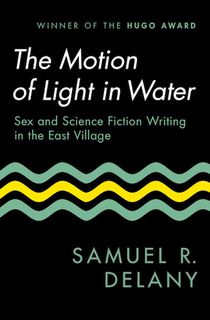If you’re a fan of exceptional science fiction, then you’ve probably heard of Samuel R. Delany—and it’s likely you’ve read his books, too. The SFWA Grand Master’s first novel, The Jewels of Aptor, was published in 1962, and since then he’s granted us fantastic works including Babel-17 (1966) and his bestselling novel, Dhalgren (1975). In addition to his sci-fi and fantasy works, Delany has also written memoirs that focus on sexuality and society.
We had the opportunity to speak with Delany about his most prestigious works, the role race and sexuality play in his science fiction, and how important it can be to read books in which you see yourself reflected.
RELATED: Black Science Fiction and Fantasy Authors You Need to Read
Most of your science fiction fans know you for your Nebula and Hugo Award-nominated and winning novels, Babel-17, The Einstein Intersection, and your Nebula-nominated Dhalgren. But what do you consider to be your finest work?
Samuel R. Delany: Over the years, that's among the most frequent opening questions interviewers have asked me—which leaves me having to haul out my most frequent answer:
Novels are like one's children, and while all are different, it's bad for the writer and bad for the books (by which I mean it’s bad for both young readers and old ones if, in interview situations such as this one, the writer inserts any of his own biases from the position of authority into the critical mix) if the writer plays favorites, especially if he’s written as few of them as I have. Sometimes, the writer can provide contextual information that might be of interest to some readers. But the writer is precisely the person who cannot be appealed to as an authority on the books' quality or value.
As far as the writer is concerned, sure, each book has what she or he hopes are its strong points; each has what she or he fears are its embarrassing weaknesses and awkwardnesses they don't want to draw attention to or that they hope readers will overlook or see and forgive in pursuit of pleasure, use, or truth. Out of respect for all three, modest silence is the response to such rash queries as yours.
Do you trust me when I say I worked as hard as I could on all of them—which already biases me? Does it help if I say that now and again a sentence of a scene came so naturally they seemed to be dictated by a higher power that only left me having to make cosmetic changes to bring them in line with what I‘d learned of the language and grammar of narrative itself—or, if it did not conform to it, would violate it in a way to cause some heretofore hidden quality to bud, bloom, and pollenate . . .? Sometimes, if you’re giving a writing workshop [choosing a favorite] is illuminating—again if the student had read the book in question and agrees or disagrees. But this is an interview, not a workshop. Choosing favorites (as is saying what’s worthless) is for readers, smart readers, to do—not for me.
Tell us about your memoir, The Motion of Light in Water, which won a Hugo Award for Best Non-Fiction Book in 1989, and details your experiences living in New York—including growing up as a gay African American and being in an open and interracial relationship with your former wife, Marilyn Hacker.
I will risk admitting that the presentation of that award was particularly warming because it was a relatively new category, and the people in the SF community who voted for it were excited by it and were excited by the changes that were coming over the community as well—and so was I.
Because I did grow up as a gay African American who moved from Harlem into the radically changing community of New York’s East Village, it might be interesting to ask why the sex and race in those early books you began by mentioning was so coded—the triples in Babel-17, or the three genders—la, lo, and le—in The Einstein Intersection, why the third is almost indistinguishable from women.
[My book] Trouble on Triton is a massive critique of a certain sort of narrow-minded heteronormativity in the face of a society that is insistently liberatory about matters gay and gay perspectives. And, to a number of critics, Nova has seemed to present in its narrative a coded relationship between Lorq and the Mouse that recalls something out of Moby-Dick, as do other aspects of the novel.
The truth is, as a gay reader, you could very easily enjoy something having nothing to do with the gay world: As a black woman reader, you might enjoy books having nothing to do with the worlds of black women. What might bother you, however, and bother you deeply, is having no books that reflect your self or your world. That’s another problem entirely.
RELATED: How Gay Is Your Geek TV?
Want more Samuel R. Delany? Sign up for The Portalist newsletter!
What might bother you, however, and bother you deeply, is having no books that reflect your self or your world. That’s another problem entirely.
Coming back to what you said about Trouble on Triton as a massive critique of narrow-minded heteronormativity—when you first wrote the book, which was published in 1976, what did you expect society's attitude towards the LGBTQIA community would be in 2017?
Trouble on Triton takes place in 2112. When I wrote it in 1976, I had no notion that the U.S. Space program would grind to a halt, not to get going again for a good while.
I thought earth would become more and more drab, and it more or less has.
I thought earth would become more and more drab, and it more or less has.
How did you first get your start as a writer, and what themes do you think are important to incorporate in science fiction?
As to the first half of that question, the truth is, I don't know. I wrote down my masturbation fantasies as a child, and hid them under my underwear in the third drawer from the top of my head-high chest of drawers. My mother found them, when I’d all but forgotten they were there, passed them on to my psychiatrist at the Northside Center, a Dr. Zeer, a man whom I did not like or trust, and to whom I lied to constantly. (He’d started out by explaining that he had had as much black blood as I did, but considered himself white, and didn’t understand why I wanted to be black: You have to understand, with my particular black family with its particular racial politics, this was not the way to get on my good side; I had wanted to see a woman doctor, but he had been selected for me because he was particularly masculine—he smoked cigars, which I found stomach turning—and was supposed to be a good model for a young adolescent male.)
Dr. Zeer passed the notebooks my mother had given him to his supervisor, Dr. Kenneth Clark, who read them, and decided to use them in an article on race and young folks. [He] cut out all the sex, turned it into a racist S&M pastiche of Conan the Conqueror, that was pretty racist in itself, and published them anonymously in an article in Harper's Magazine, in the early ’fifties, where they received a fair amount of attention. Later, the article became part of a chapter in Clark’s influential book, Prejudice and Your Child, that appeared in 1960— by which summer I was working as a waiter on scholarship at the Bread Loaf Writers’ Conference at Middlebury in Vermont. By the end of 1961, I was married (at the other end of a three-day bus ride to Detroit, Michigan). Shortly back in New York and living in the Lower East Side at the dead end of East 5th Street, between Avenues B and C, I wrote and sold my first science-fantasy novel, The Jewels of Aptor, to Ace Books, which was published toward the end of 1962.
As to the themes you should put in? The ones that confront you when you walk out your front door and look around at what you see in the street.
Nor, in terms of themes, should you forget those that strike you even before you leave the house that are thrown into relief by what you see in the world outside.
As to the themes you should put in? The ones that confront you when you walk out your front door and look around at what you see in the street.
Regarding your advice about writing what confronts you when you walk out the door: Do you think it’s more important for people to write what they know or what they’re interested in?
Over time, what you’re interested in is what you learn most about. I’m interested in how gay society works, so, yes, I live in the Gayborhood, here in Philadelphia—though the last essay on the topic I wrote, “Ash Wednesday” for Boston Review, required that I travel to New York to attend a sex party and then continue upstate to see an old “fuck buddy” of mine (whom I’ve known longer than I’ve known my current partner of 27 years) and his husband of five years, Dennis Rickett. There’s also an interview with me by Junot Díaz, who edits the Boston Review, where I talk about some of what I was trying to explore in the piece.
RELATED: Grand Master Jane Yolen on Why It's Important to Just 'Write the Damn Book'
Another question that you probably get a lot, but we’re eager to know! Are you working on anything new right now?
Alas, I have never been a writer who could talk about current projects. If I have them, talking about them at all only dissipates them and the energy behind them. So I won’t even hazard a yes or no. Sorry, I say it with a smile, however regretful, but that’s my answer.
I have some things that are finished that are slated to come out. I have a book of selected letters called Letters from Amhearst, that were initially compiled in 1989.
There is a short novel due out at the beginning of next year called The Atheist in the Attic, which is a historical reconstruction of a meeting in 1676 between Liebniz and Spinoza, from PM Press. There’s even a new short story called “The Hermit of Houston” that will be shortly published in The Magazine of Fantasy of Science Fiction, this coming October.
And a month or so ago I turned in another essay collection—quite possibly my last—whose working title is Occasional Views.
But I have reached the age where I am not sure enough about my own productions to know if I will want to write anything other than Facebook posts for the next six months or not.
Want more Samuel R. Delany? Sign up for The Portalist newsletter!




